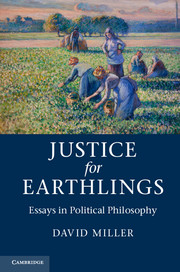Book contents
- Frontmatter
- Contents
- Acknowledgements
- Introduction
- 1 Political philosophy for Earthlings
- 2 Two ways to think about justice
- 3 Social justice in multicultural societies
- 4 Liberalism, equal opportunities and cultural commitments
- 5 Equality of opportunity and the family
- 6 Justice and boundaries
- 7 Social justice versus global justice?
- 8 ‘Are they my poor?’: the problem of altruism in a world of strangers
- 9 Taking up the slack? Responsibility and justice in situations of partial compliance
- 10 A tale of two cities; or, political philosophy as lamentation
- Index
- References
6 - Justice and boundaries
Published online by Cambridge University Press: 05 February 2013
- Frontmatter
- Contents
- Acknowledgements
- Introduction
- 1 Political philosophy for Earthlings
- 2 Two ways to think about justice
- 3 Social justice in multicultural societies
- 4 Liberalism, equal opportunities and cultural commitments
- 5 Equality of opportunity and the family
- 6 Justice and boundaries
- 7 Social justice versus global justice?
- 8 ‘Are they my poor?’: the problem of altruism in a world of strangers
- 9 Taking up the slack? Responsibility and justice in situations of partial compliance
- 10 A tale of two cities; or, political philosophy as lamentation
- Index
- References
Summary
Let me begin with a much-cited quotation from Michael Walzer's book Spheres of Justice:
The idea of distributive justice presupposes a bounded world within which distributions take place: a group of people committed to dividing, exchanging and sharing goods, first of all among themselves.
I believe that what Walzer says here is true: distributive justice is always justice within a group, and that implies the existence of a boundary between those who are members of the group and those who are not. But neither the meaning nor the truth of this proposition is self-evident. There are in fact two questions that we need to explore. First, should boundaries matter in the way that Walzer assumes or should the scope of distributive justice be universal, that is, should all human beings fall within its range (I will not consider here the issue of creatures other than human beings)? Second, if Walzer is right about the bounded nature of distributive justice, which boundaries should count? What must be true of a group of human beings in order for us to say that they form the kind of group within which principles of distributive justice apply?
Walzer's answer to this second question is not as clear as it might be. The passage I quoted above goes on as follows:
That world, as I have already argued, is the political community, whose members distribute power to one another and avoid, if they possibly can, sharing it with anyone else. When we think about distributive justice, we think about independent cities or countries capable of arranging their own patterns of division and exchange, justly or unjustly.
- Type
- Chapter
- Information
- Justice for EarthlingsEssays in Political Philosophy, pp. 142 - 164Publisher: Cambridge University PressPrint publication year: 2013



